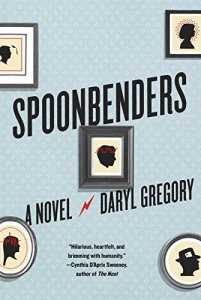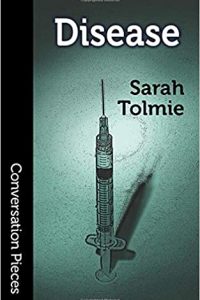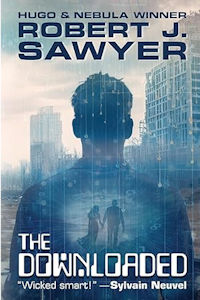Gary K. Wolfe reviews Daryl Gregory
Spoonbenders, Daryl Gregory (Knopf 978-1-5247-3182-3, $26.95, 402pp, hc) June 2017.
 Happy families may be all alike, but Daryl Gregory’s families, as a rule, need work. The father in The Devil’s Alphabet turns into a morbidly obese drug factory, the adopted baby brother in Raising Stony Mayhall is a zombie, the mom in Harrison Squared is abducted by Lovecraftian nameless ones, even the victims of various bizarre horrors in We Are All Completely Fine form a kind of family of survivors in the world’s least insurable support group. Family has been a recurring concern in Gregory’s fiction since the beginning of his career, but with Spoonbenders, he explores the dynamics of a messed-up family with greater complexity, affection, and humor than ever before. It may be the least bizarre of his novels in terms of fantasy invention, but it’s also the most deeply humane, and easily the funniest.
Happy families may be all alike, but Daryl Gregory’s families, as a rule, need work. The father in The Devil’s Alphabet turns into a morbidly obese drug factory, the adopted baby brother in Raising Stony Mayhall is a zombie, the mom in Harrison Squared is abducted by Lovecraftian nameless ones, even the victims of various bizarre horrors in We Are All Completely Fine form a kind of family of survivors in the world’s least insurable support group. Family has been a recurring concern in Gregory’s fiction since the beginning of his career, but with Spoonbenders, he explores the dynamics of a messed-up family with greater complexity, affection, and humor than ever before. It may be the least bizarre of his novels in terms of fantasy invention, but it’s also the most deeply humane, and easily the funniest.
At first, the premise seems built on pure flimflam. Several years earlier, a family of show-biz psychics going by the name of Teddy Telemachus and His Amazing Family nearly made their national breakthrough on the Mike Douglas TV show, when a surprise guest named the Astounding Archibald – a magician-turned-debunker clearly modeled on James Randi – effectively ruined their act. The patriarch, Teddy – a card shark whose only real claim to fame is his assertion that Johnny Carson stole his envelope-reading routine – invokes the usual con-man excuse that Archibald’s ‘‘negativity’’ has dampened their powers, but in fact his wife Maureen and their three children all have actual psi talents. Maureen is a clairvoyant capable of leaving her body, while the young Irene can flawlessly detect lies, Frankie is telekinetic, and Buddy is basically unstuck in time, Billy Pilgrim-like: he can experience events of the past and future almost randomly (and in a clever stylistic echo of this, he’s the only major point of view character whose chapters are always in present tense).
Most of the action takes place some 20 years later, in the summer of 1995. Maureen has long since died – which Frankie bitterly ascribes to the TV debacle – but Teddy has found a new girlfriend with the help of his old grifter techniques. Buddy has nearly gone mute, leaving unexplained his odd behaviors like digging a huge hole in the yard, though he’s unsettled by his awareness that he can see nothing beyond a certain date later that summer – which might, of course, imply his own death. Irene has ignominiously moved back to the Chicago area after her unwanted lie-detecting talent has led to an almost paralytic paranoia, and Frankie is trying to turn his limited telekinetic ability – which works pretty well with old-fashioned pinball machines – to his advantage at roulette, since he’s gotten in deep with the mob boss of Chicago’s western suburbs (a setting which Gregory evokes with convincing detail). But Irene’s teenage son Matty has begun exhibiting a wild talent like his grandmother’s: he can leave his body in what the psychics call astral projection – though he apparently can do it only when he’s extremely horny or buzzed on pot (there are enough comic possibilities there for an entire Judd Apatow movie, but Gregory doesn’t overdo it). Complicating matters further is the reappearance of a federal agent named Destin Smalls, who had recruited the grandmother Maureen in the 1960s for a secret government project involving psychics as spies (based on the real Star Gate project) and now is interested in Mattie.
By the time we get to the third act – and the novel is structured almost like a Kaufman and Hart comedy; You Can’t Take it With You came to mind more than once – even their old nemesis Archibald is back on stage, and the manner in which Gregory begins to draw all the narrative threads together, from Buddy’s hole in the ground, to Matty’s remote viewing, to a ridiculous new government weapon called a micro-lepton gun, is nothing short of brilliant. We hardly notice these plot lines as they are being shrewdly laid down, for the perfectly good reason that what pulls us through the novel is essentially its celebration of family love. Teddy, his children, and Matty are all given viewpoint chapters (and, rather subtly, each is assigned in the chapter breaks a symbol from the Zener cards once used to test for telepathy). As these tragicomic tales weave together, the emerging tapestry is as lovely as it is absurd. The fantasy elements, carefully modulated but more restrained than in Gregory’s earlier fiction, never really pretend to be much more than story devices, making Spoonbenders about the best novel about psychic hogwash I’ve seen – because Gregory knows what psychic hogwash is really good for in fiction.






